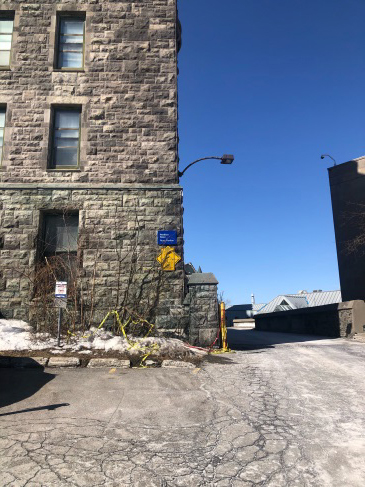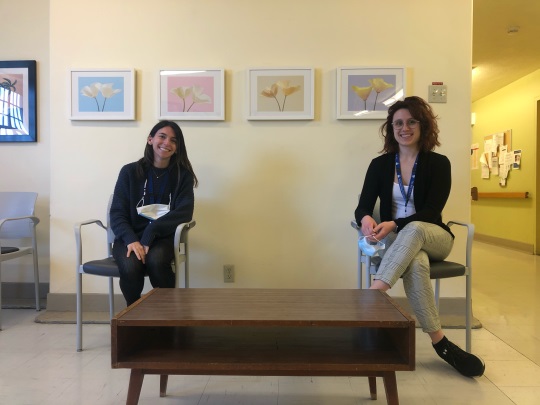How the MUHC’s Social Service department responded to the COVID-19 Pandemic
The MUHC’s Social Service department serves and supports adult patients with complex care needs. They are patient advocates who also help families cope with the stress of hospitalization, illness or injury. They also help patients transition back to their homes. While challenging during the best of times, the pandemic obviously complicates things.
Helene Jones, the Department Manager of Adult Social Services at the MUHC is blown away by her team’s capacity to quickly adapt to change and to go above and beyond in the face of adversity. “I could not be more proud! For the past year, my team stepped out of their comfort zone, offering exceptional social services during one of the most difficult periods of our careers. From the very outset during the first wave, our social workers were present across the board. Going to the airport to help screen new arrivals last April; manning the MUHC psychosocial support line; volunteering in CHSLDs; and screening visitors at hospital entrances, these professionals put aside their well-being to take care of others. They embody the essence of what a social worker really is. Not only did they make me proud but they made the MUHC proud!” says Helene.
When the hospitals began shutting their doors to visitors, and patients were left alone in their hospital beds without any contact from family, friends, or caregivers, a special team of social workers was instrumental in supporting the iPad project to help connect families and patients.

“The hospital is the last place patients want to be right now,” said Noah Markis-Morrison at the peak of the first wave last April. “The best thing we could do is reassure our patients and reassure their families by connecting them virtually.”
The peak of the second wave: From the new Vic to the Old Vic
One particularly challenging assignment taken on by two social workers was covering a temporary site in order to provide psychosocial support to the city’s most vulnerable group: Montreal’s homeless populations.
During the second wave and as part of the MSSS project to reassign essential workers to areas in urgent need of expertise, two members of the Social Service team were relocated to the Old Vic which had been transformed into a shelter for the COVID-19-positive homeless population. Challenges included itinerancy, substance abuse, mental health, and of course, a positive COVID-19 diagnosis.
Hillary Freedman and Rebecca Simard-Lavigne, who usually work at the Allan Memorial and the Montreal General Hospital with patients suffering from mental health issues like mood disorders and schizophrenia, were temporarily relocated to the Old Vic to help provide essential social services at the new shelter.
“This was certainly a different environment than my regular job,” says Hillary. “Not only was I working with the homeless population, but they were also COVID positive and it was a wet shelter. ”

“It was a less formal setting than being at the Montreal General Hospital, but I got to know much more about the different services that exist to help people get back on track whether it is addiction support, job banks, or finding low-income housing.”
Wet shelters permit clients to consume alcohol and drugs under supervision, with the aim of gradually reducing their dependence.
“I was really stepping into the unknown,” says Rebecca who spent a week and a half at the shelter. I didn’t know who I would be working with or what to expect. Despite that, I learned a tremendous amount from my new colleagues who came from different resources and shelters from across the city. I was exposed to a vulnerable clientele who often had additional challenges like addiction and mental illness. Some were in withdrawal from drugs or alcohol and my responsibility was to ensure that they were safe while quarantining. We really hoped that their time in isolation at the Old Vic could transform into an opportunity to connect with different resources and get them off the street,” says Rebecca who joined the MUHC last May after graduating.
Through it all and despite working with new colleagues, Hillary says it was a professionally enriching experience. “I witnessed difficult situations but thankfully I was surrounded by an experienced medical and psychosocial team who I partnered with.”
“The resilience, strength, compassion and courage my team has displayed day-in and day-out throughout the pandemic is a true testimony to their professionalism and dedication. On top of continuing to organize complex discharge planning and supporting MUHC patients with complex psychosocial needs like family violence, situations of abuse, financial hardship, and caregiver burnout, they really went above and beyond to support the most vulnerable, even beyond the walls of the MUHC. I am truly grateful for the exceptional social workers that have joined my team. Happy Social Work Week to all!” says Helene.
